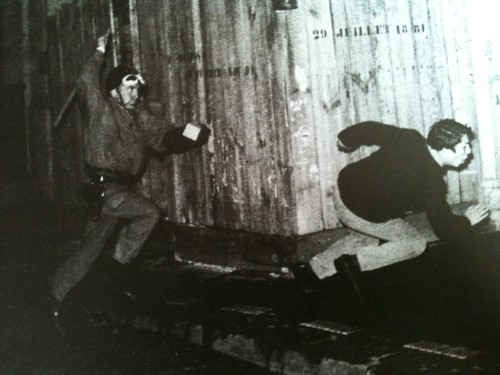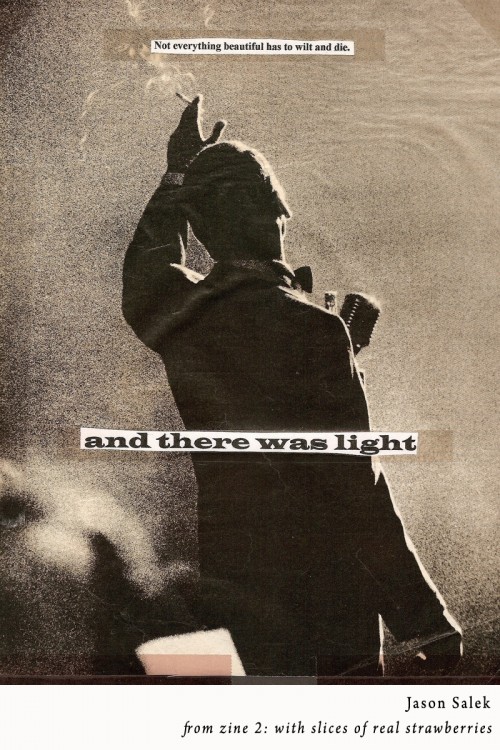“Tlön, Uqbar, Orbis Tertius” Jorge Luis Borges
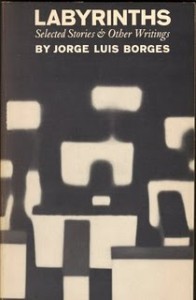 In my last post, I casually mentioned that when I first read The Age of Wire and String, I wasn’t very familiar with the precursors that had ‘made it possible’ as a book. Of course, I’m not sure exactly what earlier books helped Marcus write it, nor do I really know what it means to really ‘make a book possible.’ Instead, I think I meant that I hadn’t yet read writing that gave me a way of better appreciating The Age of Wire and String. My first reading of that book was really exciting, but difficult; I felt lost quite a lot through that book the first time. I felt that the book was isolated–and isolated me–when I first read it, but now that I’ve read some other stories and books, I think I feel comfortable putting it in a group of others that I feel do similar things to me as I read.
In my last post, I casually mentioned that when I first read The Age of Wire and String, I wasn’t very familiar with the precursors that had ‘made it possible’ as a book. Of course, I’m not sure exactly what earlier books helped Marcus write it, nor do I really know what it means to really ‘make a book possible.’ Instead, I think I meant that I hadn’t yet read writing that gave me a way of better appreciating The Age of Wire and String. My first reading of that book was really exciting, but difficult; I felt lost quite a lot through that book the first time. I felt that the book was isolated–and isolated me–when I first read it, but now that I’ve read some other stories and books, I think I feel comfortable putting it in a group of others that I feel do similar things to me as I read.
“Tlön, Uqbar, Orbis Tertius” is one of those stories that, for me, connects to The Age of Wire and String in a meaningful way. As I’ve mentioned before in some of these other posts, I had previously thought of stories as ABC tales of one character or another’s plights, such as “The Secret Life of Walter Mitty,” “To Build a Fire,” “The Most Dangerous Game,” etc., this next stage in my reading began to tune me into how words might be used for other purposes: world-building, for example.
Two years before I had discovered, in a volume of a certain pirated encyclopedia, a superficial description of a nonexistent country; now chance afforded me something more precious and arduous. Now I held in my hands a vast methodical fragment of an unknown planet’s entire history, with its architecture and its playing cards, with the dread of its mythologies and the murmur of its languages, with its emperors and its seas, with its minerals and its birds and its fish, with its algebra and its fire, with its theological and metaphysical controversy. And all of it articulated, coherent, with no visible doctrinal intent or tone of parody.
Jizz street
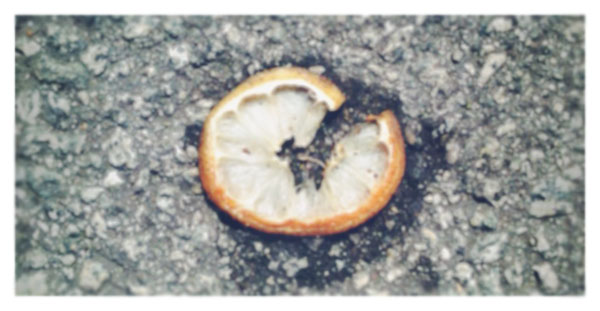
When I see, and it is often, a used condom on the street, I bend down hoping there’s a money shot inside. I don’t think I’m a perv, or gross; it’s just how brains work. You go to college, you want a job. You do crunches, you want sick abs. You see a rubber, you wanna see spunk. A money shot, by definition of it being seen, is a precluded you. When I see any circular thing on the street, like from the other side, I’m drawn towards it, crossing the road without looking both or either way, hoping it’s a condom. I understand not everyone does this, I am sorry. A similar thing happens when I see panties on the street, though that is sadder, because a girl out there is not doing so well. A properly employed condom, this is turning into an essay, represents two responsible people who wanted to feel each other somewhat, and the narrative, this is turning into fiction, is that the ejaculator for some reason feels compelled to walk into the street and snap off the condom, the orange light from the lamp above turning the money into sunny delight. And he lets it flop to the pavement for guys like me to see the next day and think this could be a post. The brightest thing in our universe is conceptual, a circle filled with sun color that goes in the upper right corner of a child’s drawing, its crooked rays as javelins to the face. I want my days to be a gigantic moving child’s drawing, each shape inaccurately drawn by tiny hands and without judgement. I put a circle in the middle of today, now I fill it in with sunset pink and bisect it by a horizontal line that stands for the edge of this world. I want a cocktail mistake to be the sun, the sun to be a condom, and the condom to be jizzed. I want us all to jizz without ever jizzing, which may be Buddhist or something, or just happy.
Michael Kimball’s US [Tyrant Books, 2011]
At last in its U.S. edition, Tyrant Books makes their third release in the form of Michael Kimball’s gorgeous US (formerly released in a different version overseas as How Much of Us There Was).
This is one of like three books ever that made me cry. I read it in a bathtub, all in one go. It is essentially the story of a old man losing his wife to sickness, but rendered in a way that only Michael Kimball knows. You should find out.
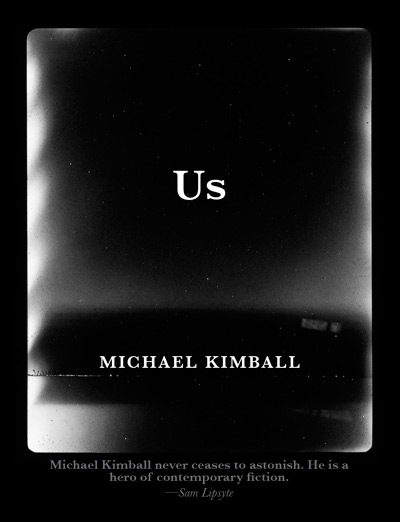
Shipping now from Tyrant Books.
James Joyce likes anal

Check out James Joyce’s raunchy love letters [thanks to LL].
e.g. “I am happy now, because my little whore tells me she wants me to roger her arseways and wants me to fuck her mouth and wants to unbutton me and pull out my mickey and suck it off like a teat. More and dirtier than this she wants to do, my little naked fucker, my naughty wriggling little frigger, my sweet dirty little farter.”
6 Books: Dinty W. Moore on Memoir
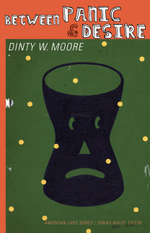 This is the first installment in a new feature where I ask a writer to recommend 6 books, old or new, sometimes according to some roomy guideline. In this case, I asked Dinty W. Moore, editor of Brevity and author of the memoir-in-essays, Between Panic and Desire, to recommend 6 memoirs. Here’s what he had to offer.
This is the first installment in a new feature where I ask a writer to recommend 6 books, old or new, sometimes according to some roomy guideline. In this case, I asked Dinty W. Moore, editor of Brevity and author of the memoir-in-essays, Between Panic and Desire, to recommend 6 memoirs. Here’s what he had to offer.
Narrowing my list of representative memoirs down to six was an agonizing task, because there are so many solid examples. To keep the undertaking manageable (barely), I’ve limited myself to the last twenty years or so, and instead of a ‘favorites’ list, I’ve chosen six examples that I think show the range of what memoir can do.
My concise description of memoir is “the truth, artfully arranged.” Now we can argue about the meaning of the word truth for weeks, but I’d rather not. I think – despite all of the weakness of memory (and for that matter, observation) – that sophisticated readers understand that the truth they are given in memoir is the author’s subjective truth. There is no hope of objective accuracy, nor would that be as interesting to read. But you go after your truth, with honest intent. That means that an author who is willingly, consciously subverting what he remembers is not writing memoir, by my definition. Cross that line, and you are writing fiction. Which is fine, but it is another project entirely.
So I’ve pulled these six memoirs down from my shelves to illustrate how a life can be presented artfully. Starting with:
This Boy’s Life, Tobias Wolff (1989): Wolff’s memoir is the first that I remember reading. I had read autobiography, of course, and long-form journalism, but Wolff’s brutally-honest, cinematic childhood memoir was the first to give me what previously I had only found in novels: the ability to escape into someone else’s life and another world, another time. Wolff wasn’t the first to write memoir in this way, but This Boy’s Life remains a touchstone to me and many other writers. I love the opening note to the reader: “I have been corrected on some points, mostly of chronology. Also my mother thinks that a dog I describe as ugly was actually quite handsome. I’ve allowed some of these points to stand, because this is a book of memory, and memory has its own story to tell.”
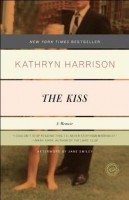 The Kiss, Kathryn Harrison (1997): Like many people, my first introduction to this book was the wave of denunciation that followed its release: denunciation of the author’s life (she engaged as a young woman in an incestuous relationship with her estranged father), and denunciation of the author’s decision to speak of it in this book. Thank goodness I eventually read The Kiss. Harrison’s restraint, her precision, her shocking honesty, and the chilling detail combine to create an unforgettable psychological portrait. Should victims remain silent? Hell no. (Random House is reissuing The Kiss next month.)
The Kiss, Kathryn Harrison (1997): Like many people, my first introduction to this book was the wave of denunciation that followed its release: denunciation of the author’s life (she engaged as a young woman in an incestuous relationship with her estranged father), and denunciation of the author’s decision to speak of it in this book. Thank goodness I eventually read The Kiss. Harrison’s restraint, her precision, her shocking honesty, and the chilling detail combine to create an unforgettable psychological portrait. Should victims remain silent? Hell no. (Random House is reissuing The Kiss next month.)
A Heartbreaking Work of Staggering Genius Dave Eggers (2000): Not my favorite book to read, frankly – it goes on too long in places, seems too clever by half in others – but Eggers shook up the form, opened possibilities, brought younger readers into the genre, and I tip my hat to him for the chances he took.
Next Tuesday in New York
Tuesday, May 17, 2011; 7 pm PROSE EVENT
With readings by Renee Gladman, Danielle Dutton and Amina Cain.
|
Renee Gladman is the author of four works of prose, most recently To After That (TOAF) and Event Factory (Dorothy) and one collection of poetry, A Picture-Feeling. Since 2005, she has operated Leon Works, an independent press for experimental prose and other thought-projects based in the sentence, making occasional forays into poetry. She teaches in the Literary Arts Program at Brown University, and lives in Massachusetts.
|
|
Danielle Dutton is the author of two books — S P R A W L and Attempts at a Life — and her fiction has appeared in magazines such as Harper’s, BOMB, and The Brooklyn Rail. She designs books at Dalkey Archive Press; teaches in The Jack Kerouac School of Disembodied Poetics at Naropa; and edits Dorothy, a publishing project.
|
|
Amina Cain is the author of the short story collection I Go To Some Hollow (Les Figues Press, 2009), and an upcoming chapbook, Tramps Everywhere (Insert Press/PARROT SERIES). She is also a curator/organizer, and a teacher of creative writing/literature. Her writing has appeared in publications such as 3rd bed, Action Yes, Denver Quarterly, Dewclaw, Encyclopedia Project (F-K), LRL, onedit, and Wreckage of Reason: Xxperimental Prose by Women Writers, and has been translated into Polish on MINIMALBOOKS. She lives in Los Angeles.
|
Curated by Kate Zambreno. Kate Zambreno is the author of O Fallen Angel, which won Chiasmus Press’ “Undoing the Novel—First Book Contest.” Another novel, Green Girl, will be published by Emergency Press in Fall 2011. A nonfiction book revolving around the women of modernism, Heroines, will be published by Semiotext(e)’s Active Agents series in Fall 2012. She writes the blog Frances Farmer is My Sister. She is also an editor at Nightboat Books.
Location: Dixon Place: 161 Chrystie Street; New York, NY
Admission: $6
“Intercourse with Resuscitated Wife” by Ben Marcus
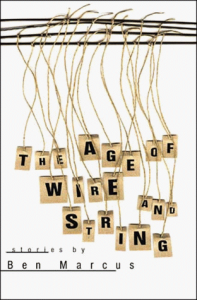 I read Notable American Women before I read The Age of Wire and String, so despite my being somewhat familiar with Marcus and his interviews and his writing, I still wasn’t quite prepared for the kind of ‘language monsters’ he had packed into those 140 pages when I opened the book for the first time in the summer of 2006.
I read Notable American Women before I read The Age of Wire and String, so despite my being somewhat familiar with Marcus and his interviews and his writing, I still wasn’t quite prepared for the kind of ‘language monsters’ he had packed into those 140 pages when I opened the book for the first time in the summer of 2006.
And although the book begins with a sort of prologue, or ‘argument,’ which describes the book as a ‘life project’ meant to catalogue the age of wire and string, I will always think of the opening sentence of “Intercourse with Resuscitated Wife” as the warning shot, a language bunch that reoriented my understanding of how a parcel of words might be arranged in unusual ways.
The dropped articles, the potential comma splice, the archaic tone, the oddity described by the text, all of these I might have seen before, but never in such a sustained and tightly controlled way as this, and not in a contemporary landscape. And furthermore, I hadn’t yet become aware of many of the precursors who made such a collection possible. So to read this first sentence was a bit shocking for me, but in a good way, and helped me take greater care in my reading and writing from then on.
Intercourse with resuscitated wife for particular number of days, superstitious act designed to insure a safe operation of household machinery.

